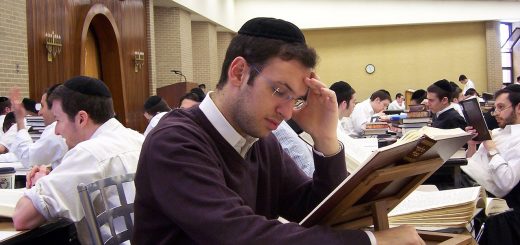Clean Air Act

Looking desperately for a small ray of light, a pocket of clean air, amidst the thick stench of what anyone following the political news would have to describe as a nationwide ethical meltdown ahead of Tuesday’s elections, I found, as Shlomo HaMelech put it, “that which my soul loved,” on WNYC this morning.
Tuning in to a “reporters’ roundtable” on the biggest tri-state election races, I heard host Brian Lehrer ask the Connecticut journalist about how Lieberman’s and Lamont’s campaigns were spending the upcoming last weekend of the contest. The latter began his response by noting matter-of-factly that as of sundown Friday evening, Lieberman would, of course, cease campaigning for the ensuing 24 hours in observance of Shabbos (not “the Sabbath”, mind you, or even “Shabbat,” but “Shabbos”). No further elaboration or discussion thereof, just that ten-second soundbite and on the conversation went.
What a marvelous moment, thought I. Whether or not it may have served to raise the consciousness of Shabbos Kodesh in the mind or heart of some Jew listening out there (or, perhaps, in mine . . .), the statement, by itself, was a pristine moment of Kiddush Shem Shomayim.
The notion that right there in the heart of a national field of combat on which otherwise rational and ostensibly decent people are inflicting every manner of verbal and emotional injury on other people, on which there seems to be no depth to which candidates will not stoop — by slur, slander or scandal — in raw pursuit of power, there stands a fellow who doesn’t just talk about putting principle above power, but goes ahead and lives it, is a greatly hopeful and uplifting one.
A bit later on, I chanced upon Peggy Noonan’s latest piece, and found a second heartening sign, this one from a non-Jew, that there are folks who have managed to maintain their humanity in the gladiators’ arena of American politics.
In this connection, I reprint below an essay entitled “Stronger Than Any Sermon,” which I wrote for Beliefnet back in 2000, when Joe Lieberman was the talk of the nation after being selected as a vice presidential candidate.
Please note that what follows should not be construed as my endorsement of everything Mr. Lieberman has said or done in his public life (which, surprisingly, Joe hasn’t sought; I’ll have to take that up with him the next time I see him.) That’s a separate topic deserving of lengthier discussion, which, perhaps, I’ll address at another time.
Beyond the broader political implications of Al Gore’s choice of Senator Joseph Lieberman as his running mate, for Jews in particular the Lieberman story holds some important lessons.
Long before he stepped into the bright national limelight, Joe Lieberman’s distinguished career in public life had already done its part to shatter some widely held preconceptions about the nature of halachic living. First, he has successfully pursued his political ambitions while remaining faithful to the tenets of Jewish tradition. This demonstrates more powerfully than any rabbinical sermon could that the oft-repeated characterizations of halacha as somehow at odds with contemporary life are rooted in ignorance of both the halakic process and the reality of observant Jewish life.
We are not privy to Senator Lieberman’s sources of halachic counsel or to the full extent to which his personal life measures up to the standards of halacha, nor should we have the interest or right to be. Each of us, after all, has more than enough to occupy us in seeing to his or her own spiritual growth.
But one thing is certain–for decades, Joe Lieberman has earnestly striven to incorporate halakah into the warp and woof of his fast-paced, high-profile life, both privately and publicly. By the same token, for all that Senator Lieberman has endeavored to live a public life informed by halakic teachings, he has had many occasions–on a weekly, even daily, basis, in fact–to draw a line at certain conduct that says to others, and more important, to himself, “This far and no further.”
From his high school days, when he was voted king of the senior prom but chose to stay home and observe Shabbat, to his first run for the United States Senate, when he passed up participating in his own nominating convention because it was held on a Saturday, and continuing with his steadfast commitment to halacha as he has ascended through the political establishment, Lieberman has consistently exalted principle over so-called pragmatism.
In so doing, the senator embodies a powerful rejoinder to the mistaken, indeed ahistorical, notion that, as a former dean of the Conservative movement’s rabbinical school put it, “In classical rabbinic Judaism generally we have never taken ‘the Torah says so clearly’ as a final, decisive and unchallengeable argument.” Joe Lieberman, like countless generations of his and all Jews’ ancestors before him, most certainly does take the Torah’s unequivocal dictates as the baseline for life decisions.
Lieberman’s principled lifestyle evokes the example set not long ago by a Shabbat observer who excels in a very different sort of arena. Tamir Goodman, a Baltimore yeshiva high school student-cum-basketball “phenom,” made national headlines last year when he turned down a full athletic scholarship to join the powerhouse basketball team at the University of Maryland.
Commenting on the teenager’s decision, his coach wrote: “So Tamir gave the [university] its scholarship back. They told him that Shabbos was a problem. He told them Shabbos was a blessing. They told him if he didn’t play it would affect his ‘career.’ He told them if he did play it would affect his ‘life.’ They drew a line in the sand. He planted his feet firmly and told them who he was and what he believed in.”
One further aspect of Senator Lieberman’s fascinating life story merits the attention of the Jewish community and of political strategists as well. By his own account, the senator’s religious commitment has not hurt, and has possibly even aided, his career aspirations.
In a public address before a Jewish group some years ago, Lieberman recalled his first senatorial campaign in 1988. After the media reported that he was absent from his own Saturday-scheduled nominating convention, he kept meeting non-Jews throughout Connecticut who would say to him, “I respect you for putting something above political success.” Often, they would add: “[T]he fact that you put something ahead of your political success, more than any particular position that you took on an issue in the campaign, is why I’m going to vote for you.”
Senator Lieberman concluded by noting that “we only won by 10,000 votes that year, that was less than 1% . . . . [A]nd who’s to say whether it wasn’t the fact that I didn’t go to my convention on Shabbos that gave me the margin of victory? . . .” This episode is representative of something that observant Jews in many different walks of life have experienced firsthand. By adhering to principle, rather than making accommodations born of discomfort with our beliefs and visibility, Jews often engender a profound respect from non-Jews who find such principled positions refreshing amidst the prevailing “everyone has their price” mentality.
And that Lieberman position, no less than his positions on matters political, is one Jews would do well to ponder.




I really do not feel very highly of Lieberman. He has been one of the vost vocal senator’s to keep Jonathan Pollard in jail. Chuck Schumer of NY does feel he should be let out of jail.
Lieberman has been in full support of homosexual rights.
Lieberman’s behavior is very disturbing and unfortunately his religious convictions seem hollow to me. It is just keeping Shabbath and Kosher but not much else.
I used to live in Connecticut and Sen. Lieberman, although I’ve never met him, inspired me to become an Orthodox Jew. If he can be a Senator while being Shomer Shabat, I can certainly be a professor while being Shomer Shabat. I supported him during his Vice Presidential campaign and his brief Presidential campaign. And one of the great disappointments to me was the lack of support from his fellow Orthodox Jews. There has never been a politician get so high in American politics who more closely reflects our values, and too many of us panned him for alleged insufficient frumness.
Regarding his supposed support of homosexual rights, he does oppose employment discrimination against Gays — but so does Yeshiva University. Does Torah require us to engage in employment discrimination? OTOH, Lieberman voted for the Defense of Marriage Act and opposes same sex marriage. In any case, that is not a single issue that makes a candidate radioactive; the *Jewish Press* endorsed Mike Bloomberg and Eliot Spitzer despite the fact that they support same sex marraige.
Finally, regarding Jonathan Pollard, Sen. Lieberman helped arrange a deal back in 1993 that would have freed him. Some details can be found here:
http://www.john-loftus.com/pollard_article2.asp